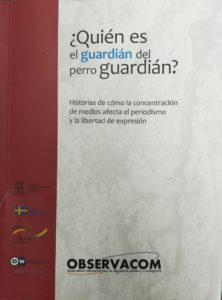When a small group of political or economic elites controls the mass media, they effectively monopolize the channels through which information circulates in society. In this way they can play an outsized role in shaping what gets covered by journalists and how it is covered. In the worst cases, they even abuse this power to further their own interests to the detriment of the public good. This is why media ownership concentration is detrimental to fostering media pluralism. It effectively limits access to a plurality of editorial lines and analyses that are essential for citizens to make their own, informed choices in democratic societies.
However, according to public polling research conducted by Latin American Public Opinion Project (LAPOP) and CIMA, it is very difficult for average news consumers to perceive the impact of media concentration on actual journalistic output. Unlike other threats to press freedom and media pluralism, like direct government censorship or attacks on journalists, the impact of media concentration is often much more indirect and opaque. And while direct threats to press freedom are often front-page news, news outlets tend not to cover the issue of media concentration prominently, if at all, as it shines a critical light too close to home. Thus, the profound effects of media concentration rarely enter into the public dialogue via the news media.
 A new publication by Observacom, a Latin American media research organization, lifts the veil on the impact of media concentration by providing concrete examples of how it impacts news production, and thus more broadly media pluralism. Who watches the watchdog: Stories of how media concentration affects journalism and media concentration (¿Quién es el guardián del perro guardián?: Historias de cómo la concentración de medios afecta el periodismo y la libertad de expresión – available in Spanish only) was officially launched at a UNESCO-convened seminar on media concentration held last month in San Jose, Costa Rica. The consensus among the experts gathered was that despite an increasing concern by analysts over the past decade about the deleterious impacts of media concentration of the health of news media ecosystems, regulators in most countries in the region have yet to take meaningful steps to address the problem. This new publication by Observacom is one positive awareness-raising step to help build broader public understanding of the issue.
A new publication by Observacom, a Latin American media research organization, lifts the veil on the impact of media concentration by providing concrete examples of how it impacts news production, and thus more broadly media pluralism. Who watches the watchdog: Stories of how media concentration affects journalism and media concentration (¿Quién es el guardián del perro guardián?: Historias de cómo la concentración de medios afecta el periodismo y la libertad de expresión – available in Spanish only) was officially launched at a UNESCO-convened seminar on media concentration held last month in San Jose, Costa Rica. The consensus among the experts gathered was that despite an increasing concern by analysts over the past decade about the deleterious impacts of media concentration of the health of news media ecosystems, regulators in most countries in the region have yet to take meaningful steps to address the problem. This new publication by Observacom is one positive awareness-raising step to help build broader public understanding of the issue.
Who watches the watchdog is divided into ten concise chapters on country-specific cases that highlight the diversity of ways that media concentration impacts press freedom. For example, a case study in Colombia shows how cross-ownership of media and other holdings can stifle coverage. The fact that the owners of RCN Television, the nation’s second largest television station, are also heavily invested in the sugar industry meant that the news outlet’s journalists minimized the strong impact sugary drinks have on the health of children as documented in a World Health Organization (WHO) report). In Nicaragua, on the other hand, a national media duopoly aligned with and even partially-owned by president Daniel Ortega has meant that criticism of the government very rarely reaches the airwaves. The other chapters on cases from Argentina, Brazil, Chile, Guatemala, Mexico, Paraguay, Peru, and Uruguay highlight similar examples of how a concentrated media sector does a disservice to a robust public dialogue that enables transparency and good governance.
The publication concludes with a list of suggestions for addressing media ownership concentration. These include adopting good corporate governance, making visible conflicts of interest, and promoting public service media as a counterweight to corporate monopolies. Indeed, all of these are necessary, but arguably the most important thing that needs to be done – and one which this publication plays an important role in doing – is to raise public awareness about how media concentration is negatively impacting the news people consume. When there is broad public understanding of the issue, it will be much easier to advocate for the necessary reforms to address media concentration. In this regard, Who Watches the Watchdog? is a much needed tool for media reformers in Latin America and beyond.
Daniel O’Maley is the Deputy Editor and Digital Policy Specialist at the Center for International Media Assistance. Follow him on Twitter at @domaley.


Comments (0)